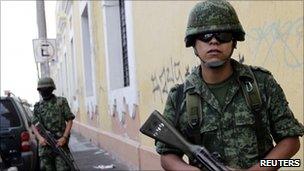Mexico says 28,000 killed in drugs war since 2006
- Published

Mexico's security forces are involved in daily gun battles with the drugs gangs
More than 28,000 people have died in drug-related violence since President Felipe Calderon declared war on the drug cartels in 2006, officials say.
The figure represents an increase of some 3,000 on the previous estimates.
National intelligence chief Guillermo Valdes said real progress had been made towards breaking the cartels' power but he admitted that violence was growing.
Most of the dead are thought to be victims of clashes between rival gangs.
Mr Valdes was speaking at a meeting with President Calderon and senior officials aimed at finding ways of improving Mexico's anti-drugs strategy.
President Calderon indicated that although he was opposed to legalising drugs, he would be open to a debate on the issue.
"You have to anlayse carefully the pros and cons and the key arguments on both sides," he said.
Last year, three former presidents, Ernesto Zedillo of Mexico, Cesar Gaviria of Colombia, and Fernando Henrique Cardoso of Brazil, said the US-led war on drugs had failed and called for the legalisation of marijuana to be considered.
The latest Mexican figures represent a big jump on the previous estimate of 24,800 dead released in July.
Mr Valdes said there had been 963 clashes between the security forces and drugs gangs since Mr Calderon took office, an average of almost one a day.
Police and soldiers had seized 84,000 weapons and nearly 35,000 vehicles, and confiscated more than $400m (ÂŁ250m) in suspected drugs money, reducing the operational capacity of the criminal gangs.
But there was still a long way to go, he said.
"With regard to the aim of establishing conditions for peace and recovering control of regions affected by organised crime, we have not achieved what we wanted. Violence is growing," he said.
Corrupting influence
Mr Valdes also said the government had to do more to tackle money-laundering and reinforce public institutions that were too weak to ensure security and justice.
The Mexican government was involved in a "dispute and struggle" for control of state and local police forces, many of which had come under the control of drugs gangs, he added.
Mr Valdes said the Mexican government was confronting a multiple challenge from criminal organisations that were well organised, with great fire power and a massive ability to corrupt.
Violent clashes between drugs gangs fighting for territory and control of smuggling routes into the US had led to a general climate of insecurity throughout Mexico, he said.